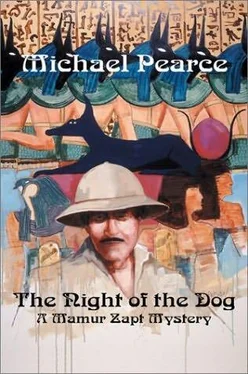Michael Pearce - The Mamur Zapt and the Night of the Dog
Здесь есть возможность читать онлайн «Michael Pearce - The Mamur Zapt and the Night of the Dog» — ознакомительный отрывок электронной книги совершенно бесплатно, а после прочтения отрывка купить полную версию. В некоторых случаях можно слушать аудио, скачать через торрент в формате fb2 и присутствует краткое содержание. Жанр: Исторический детектив, на английском языке. Описание произведения, (предисловие) а так же отзывы посетителей доступны на портале библиотеки ЛибКат.
- Название:The Mamur Zapt and the Night of the Dog
- Автор:
- Жанр:
- Год:неизвестен
- ISBN:нет данных
- Рейтинг книги:3 / 5. Голосов: 1
-
Избранное:Добавить в избранное
- Отзывы:
-
Ваша оценка:
- 60
- 1
- 2
- 3
- 4
- 5
The Mamur Zapt and the Night of the Dog: краткое содержание, описание и аннотация
Предлагаем к чтению аннотацию, описание, краткое содержание или предисловие (зависит от того, что написал сам автор книги «The Mamur Zapt and the Night of the Dog»). Если вы не нашли необходимую информацию о книге — напишите в комментариях, мы постараемся отыскать её.
The Mamur Zapt and the Night of the Dog — читать онлайн ознакомительный отрывок
Ниже представлен текст книги, разбитый по страницам. Система сохранения места последней прочитанной страницы, позволяет с удобством читать онлайн бесплатно книгу «The Mamur Zapt and the Night of the Dog», без необходимости каждый раз заново искать на чём Вы остановились. Поставьте закладку, и сможете в любой момент перейти на страницу, на которой закончили чтение.
Интервал:
Закладка:
“He dances, then,” said Owen.
“Yes.”
“Did he dance the other night?”
“I do not know. I expect so.”
“If we brought you to where you could see the Zikr, could you pick him out for us?”
“It was dark when I saw him,” said the boy unwillingly.
“We would bring you where you could not be seen. And we would pay you better than well.”
“In that case,” said the boy, “I will come.”
“Do you think you will be able to pick him out?”
“I remember now,” said Ali, “that although it was dark that night, there was also a little moon.”
The chestnut-seller laid out the chestnuts on the grating to cool and then brought them over to Owen and Georgiades. Ali slipped back into the shadows. When they looked round, he had gone.
“Will you be able to find him again?”
“No,” said Georgiades. “But the little bugger can always find me.”
He cradled the chestnuts in his hands, enjoying the warmth.
“What was so special about him being a Zikr?”
“I’ve got something else on with the Zikr.”
He told Georgiades about the killing.
“Sounds as if Mahmoud’s got it sorted out,” Georgiades said.
“Zoser, you mean?”
“Isn’t it?”
“Almost certainly, yes,” said Owen. “Still, it would be nice if it was someone else. Not a Copt.”
“At least you’ve got him. That ought to keep the Moslems happy.”
“What about the Copts?”
“They’ll be happy too,” said Georgiades, “if you get the Moslem who put the dog in Andrus’s tomb.”
“That’s why I’m hoping Ali will be able to pick him out.”
Georgiades skinned a chestnut and popped it into his mouth.
“Have you thought,” he said, “that he might be the one who’s not there to be picked out?”
CHAPTER 6
Owen had been to the Coptic Cathedral before but not to a Coptic church; so he was surprised to find that most of the congregation appeared to be on crutches. Closer inspection revealed that the crutches were in fact walking-sticks; and the need for such support soon became apparent. The service was interminably long and the congregation had to stand throughout.
The men, that was. The women were better provided for and were allowed to sit down. They were, however, segregated in a separate compartment off to the right and screened by a heavy grille, through which, nevertheless, some of the women contrived to allow themselves to be seen. The compartment gave only an oblique view of the altar, which perhaps accounted for the distinct murmur of conversation behind the grille.
Owen had borrowed the wife of a Coptic colleague as a companion for Jane Postlethwaite. The two were now inside the grille together and Mena Iskander had been given strict instructions to try to secure Miss Postlethwaite a seat from which she could see Zoser clearly and if possible his wife as well. A tall order, perhaps, though Mena Iskander was a lady of resource and intrigued by the whole situation. Fortunately, Zoser, who was the more important of the two, was also the most easily seeable.
He stood in the front row of the congregation immediately beneath one of the huge, heavily-ornamented lecterns, and during the readings his rapt, upturned face caught the light from the lectern’s candles. Watching his total absorption in the service and the way in which he hung upon the holy words, Owen could not help feeling a moment of doubt. Had they made a mistake?
However, in his time in Egypt, and before that in India, he had met many men of real devotion who yet had done the most terrible things, often in the name of the religion they served. It might be that Zoser was another such.
Of course it was not certain either that Zoser had done it or that, if he had done it, he had done it for sectarian reasons. But it had all the signs of a sectarian killing. Mahmoud had been unable to uncover anything of a personal nature which might have prompted the attack. Indeed, so far he had not been able to discover any previous relationship at all between Zoser and the Zikr. And, unfortunately, sectarian attacks were not at all uncommon. Cairo was a city of many nationalities and many different systems of belief. There were large communities of Greeks, Armenians, Jews, Turks, Levantines, Italians, French and English, as well as the more indigenous Copts, Arabs, Berbers from the south and Negroes. And each community, Cairo being Cairo, had at least two rival sects. Owen found it hard to keep track of all of them. But keep track he had to, for the sects were always at odds with each other and sometimes their differences spilled over into killings. What one tended to get, too, was not just sect against sect, but a fundamentalist sect of one religion against a fundamentalist sect of another, Christian against Moslem, another Coptic sect against-Zikr?
A sudden crash of cymbals pulled him back to the present. At regular, but otherwise apparently arbitrary points during the service an acolyte would emerge from a recess, face the congregation and clash the cymbals violently together. Then he would retire. Owen suspected that it was to make sure that nobody fell asleep. There was some danger of this since hardly anyone present could understand a word. The service was conducted throughout in traditional Coptic, a language found only in churches and a few schools, and which very few even of the Copts understood. They habitually spoke Egyptian Arabic.
There was another mighty crash and a priest began walking through the congregation swinging a censer and laying his hand on the head of anyone who offered. Among those who offered was Zoser.
People began to stir and Owen got the impression that the service was approaching its end. The priest completed his circuit and disappeared behind the altar screen, leaving in his wake a long trail of incense which gradually mounted into the roof and lost itself among the ostrich eggs and silver censers suspended there. There was a final reading, mercifully brief, and a last clash of cymbals; and then from behind the altar screen came a procession of priests and acolytes and small boys holding lighted tapers and carrying a large picture. They paraded round the church showing the picture to all parts of the congregation. Then they, too, retreated behind the altar screen with a last puff of smoke and the chanting came to an end.
Outside, he joined up with Mahmoud and waited for the two women. They came up the steps with a Coptic woman in a long black gown and veil. As they stepped out into the sunshine Mena Iskander’s reticule slipped and fell on the ground. She walked on without noticing. The Coptic woman hesitated, then picked up the reticule and hurried after Mena. Mena thanked her profusely, taking her impetuously by both hands. The woman’s sleeves fell back and there was the hand-painting.
The ladies parted. The Coptic woman went to one side and stood waiting for her husband, who was delayed in the church. Mena and Jane came towards them.
“Brilliant!” said Owen.
“Mrs. Iskander,” said Mahmoud, “you are remarkable!”
Mena Iskander looked bashfully at the ground. She was not used to receiving compliments from men in public.
“Did you see?” she asked.
Owen looked at Jane Postlethwaite. She nodded.
Zoser came hurrying out of the church and joined his wife. From under her huge hat and the light grey veil she had thoughtfully donned for the occasion Jane Postlethwaite regarded them steadily.
When they had returned Mena Iskander to her amused husband they went with Jane Postlethwaite back to her hotel, where Owen earned unmerited credit for his morning’s occupation.
“Copts,” said John Postlethwaite. “They would be a sort of Nonconformist here, would they?”
Читать дальшеИнтервал:
Закладка:
Похожие книги на «The Mamur Zapt and the Night of the Dog»
Представляем Вашему вниманию похожие книги на «The Mamur Zapt and the Night of the Dog» списком для выбора. Мы отобрали схожую по названию и смыслу литературу в надежде предоставить читателям больше вариантов отыскать новые, интересные, ещё непрочитанные произведения.
Обсуждение, отзывы о книге «The Mamur Zapt and the Night of the Dog» и просто собственные мнения читателей. Оставьте ваши комментарии, напишите, что Вы думаете о произведении, его смысле или главных героях. Укажите что конкретно понравилось, а что нет, и почему Вы так считаете.












